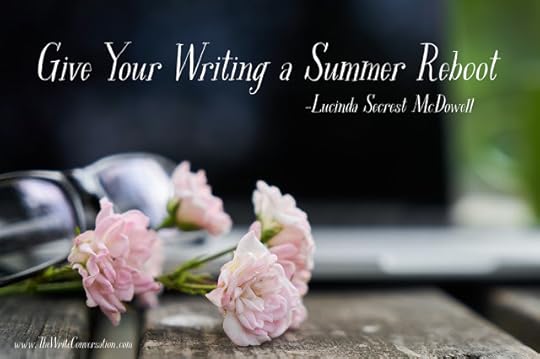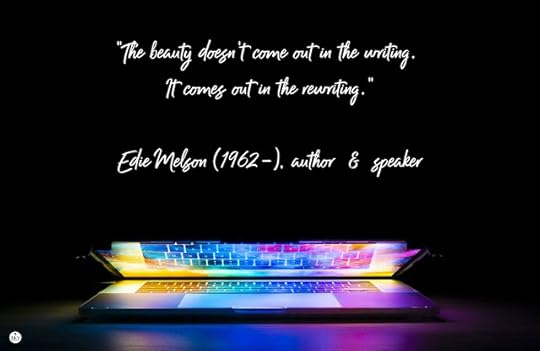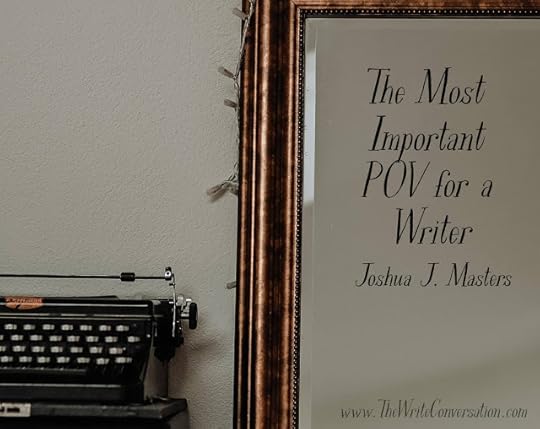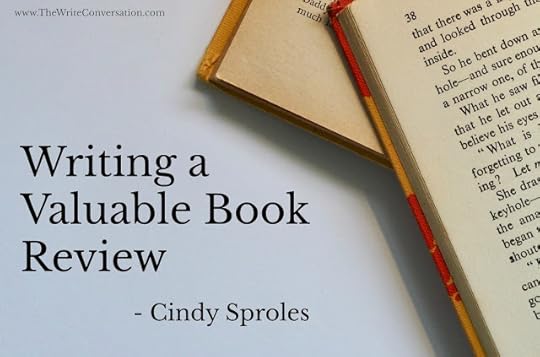Edie Melson's Blog, page 197
June 15, 2020
Give Your Writing a Summer Reboot

by Lucinda Secrest McDowell @LucindaSMcDowel
I don’t know about you, but I did not write a great masterpiece during the first 90 days of pandemic quarantine.Everyone is different. For some of you, long periods of enforced time at home was an opportunity to finally pound out that novel that’s been marinating for years. For others, the “perfect storm” of fragile health, dwindling finances, and needy family all tossed together into one small space greatly taxed your creative productivity.
You know what? Whether you are one or the other doesn’t really matter. We have survived Spring 2020 and are now heading into Summer 2020, with hope in our hearts and a renewed vigor to adapt to whatever changes have occurred.
I personally need a serious writing and speaking reboot. And if you could use a boost as well, why not try one of these simple ideas?
7 Ways to Give Your Writing a Summer Reboot
1. Give yourself GRACE.We can’t go back. If we did, we might handle March – June differently, knowing what we know now, but perhaps not. So, give yourself some grace about all that was neglected or those mistakes you made. It’s a new season – move forward.
2. Set realistic GOALS.As you begin to reboot your writing (and speaking) life, start small. Decide you will blog regularly instead of sporadically. Contribute a devotional to that online group you heard about at the writing conference last year. Brainstorm the outline for a new book, new retreat series, or a new practical and helpful workshop topic.
3. Make CONNECTIONS.Over these months you have probably made some new online friends through webinars or zoom meetings. There are many people out there doing exciting things and quite a few conferences and teaching sessions are being offered online for free. Check back in with that contact and move forward by learning from them, then perhaps offering your own skills.
4. Learn something NEW.As the entire world has moved online (at least for now) we must keep up with it! So, take a tutorial and learn how to produce your own podcast, navigate Facebook Live, or record a zoom teaching for an event. You will have much more to offer in the days ahead.
5. Keep WRITING.Keep writing down your thoughts, prayers, concerns, questions, and ideas in your journal. Of course, you keep a journal – or at least an idea book. If not, start one. This will provide great prompts for your next writing project. There has been much happening (within and without) in recent days, and you will want the wisdom from God to speak truth and grace into our world.
6. Rewrite and ADAPT.Yes, you can take musings (even social media posts) and develop them into a devotional or a meditation, an opinion column, or teaching workshop. What you have learned from quarantine parenting can be used to encourage others in the days ahead. It’s all about rewriting and presentation along a theme. Then your words can be adapted for whatever medium you might choose in the future.
7. PRAY.Of course, this one essential practice of prayer has not changed; in fact, many tell me they have prayed more during the past three months than ever before. Now we must begin to add to our prayers the request for wisdom, discernment, and a teachable spirit as God will lead you and me into new paths for our writing and speaking ministries. As always, end each pray with “Your will be done.”
I admit that a souvenir from Spring 2020 has been that my weariness has flirted with laziness. But I refuse to stay there! It’s June and I plan to reboot my writing. Will you join me?
Let me know which of these seven steps you are taking towards the future…
TWEETABLEGive Your Writing a Summer Reboot - @LucindaSMcDowel on @EdieMelson (Click to Tweet)
 Lucinda Secrest McDowell, M.T.S., is a storyteller and seasoned mentor who engages both heart and mind while
“Helping you Choose a Life of Serenity & Strength.”
A graduate of Gordon-Conwell Theological Seminary and Furman University, McDowell is the author of 15 books and contributing author to 30+ books. Her award-winning books include
LIFE-GIVING CHOICES
,
SOUL STRONG
(2020),
DWELLING PLACES
(2017 Christian Retailing BEST Award for Devotional),
ORDINARY GRACES
(2018 Selah Finalist),
LIVE THESE WORDS
, and
Refresh!
Lucinda, a member of the REDBUD WRITERS GUILD, received Mt. Hermon “Writer of the Year” award and guest blogs for The Write Conversation, Blue Ridge Mountains Christian Writers Conference Blog and (in)courage. Whether co-directing
“RENEW ~ RETREAT FOR NEW ENGLAND WRITING,”
pouring into young mamas, or leading a restorative day of prayer, she is energized by investing in people of all ages. Lucinda’s favorites include tea parties, good books, laughing friends, ancient prayers, country music, cozy quilts, musical theatre, and especially her family scattered around the world doing amazing things. Known for her ability to convey deep truth in practical and winsome ways, she writes from “Sunnyside” cottage in New England and blogs weekly at
https://lucindasecrestmcdowell.com/
Follow Lucinda on Twitter: @LUCINDASMCDOWEL
Lucinda Secrest McDowell, M.T.S., is a storyteller and seasoned mentor who engages both heart and mind while
“Helping you Choose a Life of Serenity & Strength.”
A graduate of Gordon-Conwell Theological Seminary and Furman University, McDowell is the author of 15 books and contributing author to 30+ books. Her award-winning books include
LIFE-GIVING CHOICES
,
SOUL STRONG
(2020),
DWELLING PLACES
(2017 Christian Retailing BEST Award for Devotional),
ORDINARY GRACES
(2018 Selah Finalist),
LIVE THESE WORDS
, and
Refresh!
Lucinda, a member of the REDBUD WRITERS GUILD, received Mt. Hermon “Writer of the Year” award and guest blogs for The Write Conversation, Blue Ridge Mountains Christian Writers Conference Blog and (in)courage. Whether co-directing
“RENEW ~ RETREAT FOR NEW ENGLAND WRITING,”
pouring into young mamas, or leading a restorative day of prayer, she is energized by investing in people of all ages. Lucinda’s favorites include tea parties, good books, laughing friends, ancient prayers, country music, cozy quilts, musical theatre, and especially her family scattered around the world doing amazing things. Known for her ability to convey deep truth in practical and winsome ways, she writes from “Sunnyside” cottage in New England and blogs weekly at
https://lucindasecrestmcdowell.com/
Follow Lucinda on Twitter: @LUCINDASMCDOWEL
Published on June 15, 2020 22:00
June 14, 2020
Marketing Your Book From the Heart of Your Brand

by Karen Whiting @KarenHWhiting
As I help people discover their brand, I look for the intrinsic value within the person that always comes out in the writing. This is a message that resonates with them and thus connects with their readers. It may boil down to one word like hope, overcoming, or joy, but it flows from the heart. For you as a writer, this is something that naturally finds its way into most of what you write. That should be clear within the brand.For example I recently spoke with a children’s author who started talking about her book about Grandma and child. As I dug deeper, I realized whether she wrote about cats or kids, she always wove in heritage and passed on legends, customs, and traditions. Her brand was all about sharing heritage so children would seek and value their own heritage, feel accepted, and develop a sense of belonging. For another writer who said she wrote romance that reflected real life I listened and discovered she used romance stories to show how couples can support one another while growing or starting a relationship. Her characters draw out the best in each other to solve the problems they face. Her books show couples, and even singles as they meet people, how to use one another’s strengths to form a team that is better than either individual. Once you have the brand that really reflects the message in your heart it’s easier to promote the books within the brand because it’s also a passion for you.Ask the connecting questions to the brand on social media to find your tribe. Your heart’s value should resonate with them. So if it is heritage, and you write for children, ask grandparents to share what they most want their grands to learn about their heritage or ask Moms what heritage foods they cook or purchase. When it’s close to a holiday, ask followers to share a tradition and why it’s important. Write personal messages to individuals who respond in a way that identifies them as your ideal readers. Add them to a reader list.Share your brand’s message on your website by naturally talking about why that message can impact lives and why it matters to you. The author who shares the strength of couples working together easily shares her own story of finding strength in her husband and what strengths she bring to the relationship as well as many stories she collected from other couples. Those stories touch the hearts of readers who long for a strong marriage relationship.Brainstorm all the words that relate to your brand and use some of the concepts. Check for additional questions that a google search shows or from questions generated by answerthepublic.com. Post these phrases and questions to find your tribe. Use them as the focus for articles and blog posts.Share testimonies people give you related to your brand. When what you write resonates with a reader, he or she will feel connected to you and want to share their story.Identify the questions that generate a bigger response, create a meme for it, and post that to your other social media accounts.Create tip sheets that flow from your heart on the book’s topic. Address the needs you will help them fill through your writing.A brand from the heart helps you write more intentionally. You can ask yourself how the piece or story shares the real need your brand promises. So, my tag line is Growing tomorrow’s Wholesome Families Today. As I write I ask myself how this helps a family grow and connect. I also ask what need of a family can I address through this chapter or article and what tool can I give them that they can apply immediately. In writing from the brand, you build a message that your tribe needs. You can use those take-aways and smaller messages as short posts for social media. Every time one of those messages connects to a reader you grow your audience and your brand.
The brand that comes from the heart is the building block of marketing. It’s the place to return to each time you need to think about marketing ideas or create marketing for a new book.
TWEETABLE
Marketing Your Book From the Heart of Your Brand - @KarenHWhiting on @EdieMelson (Click to Tweet)
 Karen Whiting (www.karenwhiting.com) is an international speaker, former television host of Puppets on Parade, certified writing and marketing coach, and award-winning author of twenty-six books for women, children, and families. Her newest book, 52 Weekly Devotions for Families Called to Serve, uses stories, activities, and chat prompts to help families develop servant hearts and foster strong bonds in families who have members serving the community, nation, or world.
Karen Whiting (www.karenwhiting.com) is an international speaker, former television host of Puppets on Parade, certified writing and marketing coach, and award-winning author of twenty-six books for women, children, and families. Her newest book, 52 Weekly Devotions for Families Called to Serve, uses stories, activities, and chat prompts to help families develop servant hearts and foster strong bonds in families who have members serving the community, nation, or world.She has a heart to grow tomorrow’s wholesome families today. She has written more than seven hundred articles for more than sixty publications and loves to let creativity splash over the pages of what she writes. She writes for Leading Hearts and Crosswalk.com. Connect with Karen on Twitter @KarenHWhiting, Pinterest KarenWhiting, and FB KarenHWhiting
Published on June 14, 2020 22:00
June 13, 2020
Lessons from Dad

by Martin Wiles @LinesFromGod
My dad taught me many honorable lessons, but two stand out.
The first lesson came when Dad said, “Don’t put off until tomorrow what you can do today.”
I heard the statement numerous times from Dad—and often didn’t want to. I’m not sure if he had heard it from his parents, but if he didn’t, he must have picked it up from somewhere else. As a first-born child, telling me this comprised part of his effort to teach me responsibility. I suppose along life’s way he had learned some lessons about procrastination—a fancy word for not putting off until tomorrow what you can do today.
Dad pastored smaller-membership churches and had to unlock the doors on Sunday mornings. He arrived early—thirty minutes to be exact. Too early for Mom. She came later because she was never ready thirty minutes ahead of time. Dad justified his early leaving by appealing to the “something might happen” logic. Something such as traffic jams, wrecks, a flat tire.
My personality made learning this lesson easy. When I began working, I showed up thirty minutes early—sometimes earlier. Something might happen along the way. I also wanted to be ready to do my job when the time came for me to start. I’m now almost retirement age, and I still carry out the lesson. When I go to a movie, the theater, or out to eat, I always show up earlier than the starting time. If I have an appointment, I arrive early. The trouble is, not everyone thinks the same as I do about procrastination.
I once taught a student who had an English project due on Monday—a project she had known about since the first day of school when I handed out the syllabus. The Friday before it was due, she wanted more information and explanation. I refused. I wanted to teach her the lesson Dad had taught me. She didn’t appreciate my effort.
The wisest man who ever lived said something similar: If you put off working, you won’t prosper. Nor will you have money to pay the bills or to put food on the table. “Lazy people want much but get little, but those who work hard will prosper”(Proverbs 13:4 NLT).
Among the many things I shouldn’t put off are turning my life over to Christ, loving my spouse and children, being kind, sharing God’s love, praying, reading God’s Word, loving others, forgiving others, and working hard. I think I’ll do those today.
A second lesson came when Dad said, “Remember, son, your actions have consequences.”
If I ever forgot what Dad told me, all I had to do was look at one wall in my bedroom. On it, hung a framed set of rules, along with the consequences for breaking each one. Dad was a proponent of corporal punishment. He had no problem whipping his black belt from the loops on his pants and applying it to my hind parts. He never abused me, nor did he ever strike me in a place he shouldn’t have, but I learned the lesson about actions and consequences.
At some point, the framed set of rules disappeared. Perhaps, as I got older, Dad thought I had learned them without having a visible reminder. And, too, as I got older, he used other methods of discipline, such as taking away things I enjoyed—or the most terrible thing, making me get a haircut. I grew up in the hippie years, so I loved my long hair. Dad knew how I felt and used this to modify my behavior.
I can’t say I used Dad’s exact techniques with my two children, but through various methods, I taught them their actions had consequences.
Several of Israel’s tribes wanted to settle east of the Jordan River instead of living in the Promised Land. God granted their wish but had Moses remind them of their promise: help their kinsmen conquer the inhabitants of the Promised Land before they returned to their families on the other side. If they didn’t, God would classify it as sin, and their actions would have consequences. “But if you fail to keep your word, then you will have sinned against the Lord, and you may be sure that your sin will find you out” (Numbers 32:23 NLT).
We love focusing on the loving side of God’s nature, but that loving side includes discipline, just as it does with parents and children and behavior. God must discipline our wayward actions because of His holiness. He cannot let sin go unpunished. Although He punishes our sinful actions, He rewards our obedience. And the wonderful news is that He gives us the Spirit to help us obey so we don’t have to endure the negative consequences of unhealthy behavior.
I don’t know what lessons you learned from your Dad (and Mom), but hopefully they were worthy of passing along to the generations that follow you. After all, good lessons are always worth sharing.
TWEETABLELessons from Dad - encouragement from martin Wiles, @LinesFromGod, on @EdieMelson (Click to Tweet)
 Martin Wiles is the founder of Love Lines from God (www.lovelinesfromgod.com) and serves as Managing Editor for Christian Devotions, Senior Editor for Inspire a Fire, and Proof Editor for Courier Publishing. He has authored six books and has been published in numerous publications. His most recent book, A Whisper in the Woods: Quiet Escapes in a Busy World, released in December 2019. He is a freelance editor, English teacher, author, and pastor.
Martin Wiles is the founder of Love Lines from God (www.lovelinesfromgod.com) and serves as Managing Editor for Christian Devotions, Senior Editor for Inspire a Fire, and Proof Editor for Courier Publishing. He has authored six books and has been published in numerous publications. His most recent book, A Whisper in the Woods: Quiet Escapes in a Busy World, released in December 2019. He is a freelance editor, English teacher, author, and pastor.
Published on June 13, 2020 22:00
June 12, 2020
Pursuing Beauty in Your Writing

by BethVogt @BethVogt
When other writers talk, I like to sit back and listen. Often I take notes. Perspective is a powerful catalyst for change, and another writer’s take on the writing journey broadens my understanding. I come away encouraged. Wiser. Motivated to try something new.
Her exact words? “The beauty doesn’t come out in the writing. It comes out in the rewriting.”
Whether we write nonfiction or fiction, whether we write for adults or teens or children, whether we write romance or sci-fi or speculative or women’s fiction or YA, we all want our words to embody beauty.
But beauty don’t come easy. It’s not instantaneous. It requires effort. For writers, effort equals rewriting.
That icky first draft? It’s supposed to happen. It’s part of the process. All those words we write and then delete and try again? Each word is needed in our pursuit of beauty.
We’re not supposed to be content with what we first write. Our initial attempt never matches up with what we want to say because we’re striving for more, for those striking words and sentences and paragraphs and pages that “ping!” with us and with our readers.
A frustrating first draft doesn’t mean we’re doing anything wrong. It means we now have something to work with so that we can make it right. We can cut and paste and polish until we find the beauty in our story.
Trust me, it’s there.
We’re not pursuing perfection. That’s an impossible goal in any area of our life. But beauty? That is attainable. We each have our own distinctive beauty displayed within the pages of our books by our voice, our word choice, our pacing, our themes … how we interpret the writing craft.
The next time you’re frustrated because the words aren’t right or because you have to tear that article or that scene or that manuscript apart again …
… breathe in and breathe out.
Remember you’re not doing anything wrong.
You’re pursuing beauty in your writing.
TWEETABLEPursuing Beauty in Your Writing - @BethVogt on @EdieMelson (Click to Tweet)
 Beth K. Vogt believes God’s best often waits behind the doors marked “Never.” Having authored nine contemporary romance novels and novellas, The Best We’ve Been, the final book in Beth’s Thatcher Sisters Series with Tyndale House Publishers, releasers May 2020. Other books in the women’s fiction series include Things I Never Told You, which won the 2019 AWSA Award for Contemporary Novel of the Year, and Moments We Forget. Beth is a 2016 Christy Award winner, a 2016 ACFW Carol Award winner, and a 2015 RITA® finalist. An established magazine writer and former editor of the leadership magazine for MOPS International, Beth blogs for Learn How to Write a Novel and The Write Conversation and also enjoys speaking to writers group and mentoring other writers. Visit Beth at bethvogt.com.
Beth K. Vogt believes God’s best often waits behind the doors marked “Never.” Having authored nine contemporary romance novels and novellas, The Best We’ve Been, the final book in Beth’s Thatcher Sisters Series with Tyndale House Publishers, releasers May 2020. Other books in the women’s fiction series include Things I Never Told You, which won the 2019 AWSA Award for Contemporary Novel of the Year, and Moments We Forget. Beth is a 2016 Christy Award winner, a 2016 ACFW Carol Award winner, and a 2015 RITA® finalist. An established magazine writer and former editor of the leadership magazine for MOPS International, Beth blogs for Learn How to Write a Novel and The Write Conversation and also enjoys speaking to writers group and mentoring other writers. Visit Beth at bethvogt.com.
Published on June 12, 2020 22:00
June 11, 2020
The Most Important POV for a Writer

by Joshua J. Master @JoshuaJMasters
Although I have a Christian Fantasy novel buried in the depth of my imagination, crying out from the dungeon of my mind to take flight on wings of dragons, I’m primarily a nonfiction writer. So, I struggled with learning point of view (POV) writing, especially deep POV. It’s an important skill to learn, but if we want our writing to make a difference, there’s a POV even more important than our character’s and deeper than a clever scene setting that we need to master. Our writing can only have a lasting impact if we’re willing to evaluate our own point of view and where it comes from.
Recent events in our culture have highlighted this concept as our nation faced arduous days of suffering with a life-altering pandemic, racial unrest, and political uproar. Have you noticed many of the people you know have vastly different views on these issues? You probably have, since many of them have made their point of view well known.
People are screaming their opinions through worn keyboards with rash and unedited thoughts—many of which need editing, both in their attitude and grammar.
Their goal is to force a view on the reader rather than understand their reader.
I point this out not to make a political statement, but to illustrate how our personal point of view can obscure the sincerity of our craft.
Agenda always deflates sincerity.
The way we respond to any situation greatly depends on our experiences and past hurts. Our personal POV develops from our pain and fears. POV could stand for Pain on View, making it virtually impossible for us to see someone else’s point of view unless we actively seek it out. Our POV is deep-rooted and unshakable without practice and training.
How does that affect our writing? Well, we tend to believe everyone has (or should have) the same point of view we do, so we write from that perspective. But they haven’t had the same experiences or hurts we’ve endured. Everyone sees the world through a broken lens, but our lenses have been created and broken differently, so we never see a situation the same way.
When our writing is informed by a single POV, it becomes bland and uncolored. Every character at her core will be the same. Worse, our writing will have less universal appeal because we’ll unknowingly exclude others from identifying with what we’ve written.
That’s not to say we write to please everyone, but rather in the practice of writing we strive to understand others. That requires us to study and even challenge our preconceived opinions, agendas, and feelings that make up our point of view.
Without studying our thoughts and emotions, we blindly surrender to them, never realizing we’ve become a slave to our own experiences.
When we write historical fiction, we research the period.When we write legal thrillers, we research the law.When we write comfy mysteries, we research our plot twists.When we write Bible studies, we research Scripture.
But it all falls flat if we’re unwilling to test: Our own history, Our own forms of legalism, Our own thinking forged by the plot twists in our lives,And our own place in God’s Word.
Are we willing to examine our own POV and work toward a greater understanding of someone else’s to enrich our writing? Because that propels the craft of writing from an agenda-based activity to a culture-changing art.
Writing that meets the hearts of many requires an understanding of many.
May we challenge ourselves and one another to examine our own point of view, heal from our past hurts, and write with a purpose greater than our own emotions.
TWEETABLE
The Most Important POV for a Writer - @JoshuaJMasters on @EdieMelson (Click to Tweet)
 Joshua J. Masters is a pastor, author, and speaker. He’s been featured on CBN Television, HIS Radio, and the Light Radio Network. Josh is the author of American Psalms: Prayers for the Christian Patriot and is a contributing author for Feed Your Soul, Refresh Bible Study Magazine, and One Christian Voice. Josh has also worked as an actor and crew member in the film industry (SAG/AFTRA) and continues to have a passion for film. He lives with his wife, Gina, and Franklin the Pup outside Greenville, South Carolina where he serves as a speaking and care pastor.
Joshua J. Masters is a pastor, author, and speaker. He’s been featured on CBN Television, HIS Radio, and the Light Radio Network. Josh is the author of American Psalms: Prayers for the Christian Patriot and is a contributing author for Feed Your Soul, Refresh Bible Study Magazine, and One Christian Voice. Josh has also worked as an actor and crew member in the film industry (SAG/AFTRA) and continues to have a passion for film. He lives with his wife, Gina, and Franklin the Pup outside Greenville, South Carolina where he serves as a speaking and care pastor.Josh would love to connect with you on his website, www.joshuajmasters.com or engage with you on Facebook, Twitter, Instagram, or Goodreads.
Published on June 11, 2020 22:00
June 10, 2020
What's Your Biggest Writing Fear?

by Julie Lavender @JLavenderWrites
What’s your biggest writing fear? Fear of rejection?Fear of not finishing the job?Fear of not being good enough?My mind fought with all three recently, and more, when I faced several deadlines on newspaper work that I didn’t seem to have enough hours in the day to complete, worked to finish a proposal to send in to my agent, and muddled through postings for a social media campaign to help promote my upcoming book release.
I plucked away at the computer in my favorite den rocking chair, just four steps across the foyer from the front door. When I heard a loud sound that sounded like a cross between a knock on the wooden door and the delivery guy dropping a package on the front porch, I was surprised that neither the golden retriever nor Pomeranian at my feet seemed to acknowledge the sound.
Placing the computer on the tray, I stood up and could see out the dining room window as I walked to the door. “That’s odd,” I thought when I didn’t see a vehicle backing out of the driveway.
I peered out the dining room window, craning my neck towards the floor in front of the door to locate a package. The frosted pane on the front door doesn’t allow the same view.
Noticing nothing, I almost returned to my chair, and then thought perhaps the stray cat was responsible for the sound. “I’d better check on her; she did just have kittens, you know.” Yep, writers have conversations with themselves, right?
I opened the door just a bit—I didn’t want the stray but friendly feline that my husband and I are allergic to darting into the house.
No cat, but I found the source of the racket. My metal plaque with lavender herbs etched on either side of the word “Welcome” lay face-down on the porch.
“Hmmm. How did that get knocked over?”
I leaned out even farther, hand still on the doorknob, and stood face-to-face to a snake that was inching its way up the door frame. Just at that moment, about four inches of his its flipped into the doorway.
A blood-curdling scream erupted from my lips, hair stood on end, and I slammed the door. I developed a splitting headache before the door even made contact with the frame.
My furloughed 23-year-old son came running and stared questioningly at me as I mumbled gibberish. I only began to make sense when his hand came near the doorknob.
My hands shook, and my knees quivered. Being married to a reptile-loving, wildlife biologist for thirty-six years hasn’t removed the abject phobia I’ve had of snakes since I was a little girl.
My son and I donned shoes and went outside via another door. He fetched my husband’s snake stick, a wooden pole with a curved hook-like end, and gingerly lifted the scary serpent and placed it into a bucket. I watched from afar—very far.
Once my son secured the lid of the bucket and my offender was subdued, I returned to the computer, but the pounding headache and equally-pounding heartbeat didn’t let me return to work. Besides, my hands quivered too much to use the keys.
When my husband came home from the office—and might I add, on one of the two days he’d actually gone into the office to work since the pandemic began—any other day since March 17, he sat just a few feet away from me in another office with his snake-loving self—he removed the lid and said, “Oh, it’s a yellow rat snake. Isn’t he gorgeous?”
David promptly relocated the intruder to another location. My blood pressure finally reached safer levels, and I took a couple of deep breaths and plucked away on computer keys again.
It didn’t take a stretch of my imagination to see the analogy of the hero son rescuing me from the evil one and his loving father casting the demon far, far away from me.
When the evil one knocks on your door, filling you with fears of discouragement, what will you do to thwart him?
Reciting countless “do not fear” verses helps me when those writing discouragement days rear their forked-tongue heads. I also keep these verses in mind, too, to fight against:
Fear of rejectionRomans 8:31: What then shall we say to these things? If God is for us, who can be against us?
Romans 8:28 NIV: And we know that in all things God works for the good of those who love him, who have been called according to his purpose.
1 Peter 2:4 NLT: You are coming to Christ, who is the living cornerstone of God’s temple. He was rejected by people, but he was chosen by God for great honor.
Fear of not finishing the job2 Corinthians 8:11 NIV: Now finish the work, so that your eager willingness to do it may be matched by your completion of it, according to your means.
Ephesians 6:10 NIV: Finally, be strong in the Lord and in his might power.
Philippians 3:14 NIV: I press on toward the goal to win the prize for which God has called me heavenward in Christ Jesus.
Philippians 1:6 NIV: being confident of this, that he who began a good work in you will carry it on to completion until the day of Christ Jesus.
Fear of not being good enough2 Corinthians 3:5 NLT: It is not that we think we are qualified to do anything on our own. Our qualification comes from God.
2 Corinthians 12:9 ESV: But he said to me, “My grace is sufficient for you, for my power is made perfect in weakness.” Therefore I will boast all the more gladly of my weaknesses, so that the power of Christ may rest upon me.
Ephesians 2:10 NLT: For we are God’s masterpiece. He has created us anew in Christ Jesus, so we can do the good things he planned for us long ago.
When writing fear knocks at the door, call on the Son and the Father, read God’s word, take a deep breath, and type on.
TWEETABLEWhat's Your Biggest Writing Fear? @JLavenderWrites on @EdieMelson (Click to Tweet)
 Julie’s heart beats faster when she thinks about her upcoming book, 365 Ways to Love Your Child: Turning Little Moments into Lasting Memories, but fortunately, no slithering reptiles are involved. Julie’s parenting book, published by Revell, releases in October. She’d love for you to connect with her on a Facebook Group page by the same name, 365 Ways to Love Your Child (go here https://www.facebook.com/groups/607967430049843/) to join the conversation about showing love to a child.
Julie’s heart beats faster when she thinks about her upcoming book, 365 Ways to Love Your Child: Turning Little Moments into Lasting Memories, but fortunately, no slithering reptiles are involved. Julie’s parenting book, published by Revell, releases in October. She’d love for you to connect with her on a Facebook Group page by the same name, 365 Ways to Love Your Child (go here https://www.facebook.com/groups/607967430049843/) to join the conversation about showing love to a child.
Published on June 10, 2020 22:00
June 9, 2020
Simplify Your Writing Life with These 10 Tips

by Edie Melson @EdieMelson
So often we make things harder than they have to be. Sometimes we do it because we’re used to doing things a certain way, or because it’s the only way we know how. But things change quickly these days, and it’s always a good thing to take a look at your routine with a fresh eye.
Today I’m going to share some tips to streamline your writing life. Some you may already do, some you may not have ever considered. Just take a look at the list with an open mind and see if there’s anything on it that can make your life easier.Simplify Your Writing Life1. Take a look at your goals. It’s important to have goals—and it’s important to have written goals. It’s easy to just float along, taking things as they come. But when we do that, it’s hard to make progress—and it’s even harder to evaluate progress. Beyond that, there’s something almost magical about writing down your goals. Having them recorded somewhere gives them weight and makes it easier to make them a priority.
2. Evaluate how much time you’re spending on social media. If it’s more than thirty minutes a day, it’s time to re-evaluate. After thirty minutes, your return on investment takes a severe nosedive in the downward direction.
3. Let go of your expectations. No this isn’t a contradiction of #1 above. There is a huge difference between goals and expectations. I bet if you’re honest with yourself you have quite a few expectations—from what you expect from yourself, to what you expect from others. For me, when I took a hard look, a lot of those expectations were totally unreasonable. So spend some time and take a hard look at your expectations. The ones that are reasonable, make into goals and priorities. The rest of them . . . well . . . just throw them away.
4. Determine when, in a 24-hour period, you are most creative. Some of us are night people, some are morning people, and some of us work best in the afternoon. But we each have a specific time when the words and ideas tend to flow easier. Look at your internal clock and figure out when that time is. Then, guard it like you’re guarding gold. Really that’s what you’re doing. Our income and dreams are locked up tight with our ability to create. When we figure out the time that work best for creative work, it’s like someone has handed us pure gold.
5. Come up with a way to schedule your time. I know not everyone can have a detailed schedule. But truthfully, if you’re trying to carve out time to write (and who isn’t?), you need to schedule that time. There are lots of methods to help with time management from an old fashioned spread sheet to the Pomodoro Technique. Do some research and find something that works for you.
6. Commit to quit talking negative to and about yourself. When someone bashes our ability and/or our manuscript, it takes time to recover. The same holds true when we do it to ourselves. So take a page from my author friend, Alton Gansky, and QUIT IT!
7. Take care of yourself physically. This means getting enough sleep, eating well, and especially exercising. The sedentary lifestyle of a writer can quickly take its toll on us physically and mentally. Sure these things take time—often time we don’t feel we can spare. But even though this may seem counterintuitive, it will streamline your writing life. You can accomplish so much more when you are physically healthy and mentally alert.
8. Build in regular breaks. Especially when I’m on a deadline, I’ve found that taking regular breaks greatly improves my productivity. A good friend and spiritual mentor of mine Kent Pate has a saying, “Divert daily, withdraw weekly, abandon annually.”
9. Surround yourself with encouraging writers. You don’t just need encouraging friends, but also encouraging writers. We writers are an odd lot, and we need others around us who understand our thought process, our struggles and our quirky joys. These writers should be active and growing—not those who just talk about writing, but those who spend time writing.
10. Engage a prayer team. This may seem odd, especially if you’re fairly new to even calling yourself a writer, much less having something published. But the truth is, this life is hard. When we answer God’s call to step out and share His message, we’re going to encounter spiritual warfare. For that, you need people to pray for you. If you’re also building a ministry, trying to grow an income and/or beginning to speak, that’s even more of a reason to surround yourself with prayer. These folks don’t have to be writers, but they should have a connection to you.
These are just some of the things that do to help my writing life stay manageable. I’m sure there are lots of other things that would help as well. Be sure to chime in with your suggestions in the comments section below.
Don’t forget to join the conversation!Blessings,Edie
TWEETABLESimplify Your Writing Life with These 10 Tips - @EdieMelson (Click to Tweet)
 Edie Melson is a woman of faith with ink-stained fingers observing life through the lens of her camera. No matter whether she’s talking to writers, entrepreneurs, or readers, her first advice is always “Find your voice, live your story.” As an author, blogger, and speaker she’s encouraged and challenged audiences across the country and around the world. Her numerous books reflect her passion to help others develop the strength of their God-given gifts and apply them to their lives.Connect with her on her website, through Facebook, Twitter and on Instagram.
Edie Melson is a woman of faith with ink-stained fingers observing life through the lens of her camera. No matter whether she’s talking to writers, entrepreneurs, or readers, her first advice is always “Find your voice, live your story.” As an author, blogger, and speaker she’s encouraged and challenged audiences across the country and around the world. Her numerous books reflect her passion to help others develop the strength of their God-given gifts and apply them to their lives.Connect with her on her website, through Facebook, Twitter and on Instagram.
Published on June 09, 2020 22:00
June 8, 2020
Writing a Valuable Book Review

by Cindy Sproles @CindyDevoted
Sitting on the cusp of a new book release, the reality of good book reviews weigh heavy. The natural questions of acceptance raise our worry level just a smidge. Will readers like the book? Will they even post a review? What about the hate reviews?I’ve often wondered what good a review is. They do serve a higher purpose. Whether you have one book review or hundreds showing, they guide the possible reader to your work.
Writing a review is more than telling others that you liked the book. Though that is a primary purpose, a review can make or break the success of a book, simply because those bad ones always seem to be the ones that stay at the top of the pack.
The purpose of a review is to let others know about the book. How they liked it and what impressed them most about the words you’ve written. It doesn’t have to be 800 words long to make a strong impact. The biggest impact is that the reader took the time to post it. These days, this is a plus.
Dos and Don'ts for Writing a Book ReviewWrite one: Getting a reader to write a review is a chore so how do we make that happen? Truthfully…write an impactful book. When a writer truly crafts a strong story that moves the reader, their excitement forces them to want to share. Whether your book is just a great story or a piece of non-fiction that speaks to the masses, a well-written book will move readers to want to share it. That aside, learn to make writing a review part of your reading habit. Every time you read a book, post a review.
Write a review, not a novel: Goodreads is a great place for reviews. The problem with Goodreads is reviews are paragraphs long. When a reader looks to purchase a book on Amazon, they tend to read the first three to four lines. I asked readers, what makes them read or not read a book review? Their first response – I like a short review. Second, I hate it when a review tells me the whole story. This circles back to “short and concise.” These takeaways tell me something. Make your review short to the point. Don’t paraphrase the entire book. The average reader wants to know: 1) do you like the book 2) was it a fast read or slow and thought-provoking 3) would you read more from this author? As you pen your reviews keep that basic information at the forefront. A good review is short and gives the reader the answers to the questions they seek about the continuity of the book.
Pen with kindness: I get it when a reader hates a book. It’s important to go into reading reviews with tough skin. Every book is not going to be loved by every reader. My first novel was a very hard subject and to top it off, the bad guy was a pastor. I knew the subject matter would draw some heat. To my surprise, only a handful of reviews were harsh and only one was horrible. A reader accused me of being a horrible person and if that wasn’t enough, she attacked my family. It upset me but truthfully it probably worked to my advantage for some readers, sparking a curiosity to see exactly what horrid things I had done. When you write a review, even if you hate the book, be kind. Simply state that this was not a book you enjoyed and why. Here is an example of a 1-star review written nicely.
I can’t lie. This was not a book I’d recommend. It was filled with violence and I’m just not good at reading that stuff. In fairness, the writer of this book made an engaging book which is why I finished reading it. If you have a history of being abused, you may want to skip.
The reader didn’t care for the book, but she was honest and kind in her remarks. Avoid getting personal. It does nothing for either of you.
Respond to bad reviews: Many folks will tell you to just look past the bad reviews. Don’t respond. I would say, respond with gratitude even when you want to attack the reviewer. If I receive a bad review this is my response. Thank you for taking the time to read ___________. I realize it wasn’t your cup of tea, but I wanted to thank you for investing your valuable time in reading and posting a review.
Why do I do that? 1) the reader bought the book. That sale generates a royalty payment. 2)everyone’s time is valuable and worthy of a thank you. They may not like my book, but they took the time to purchase, read, and post a review. When you get a bad review, simply be grateful for the positive. Don’t respond with a snide remark. That only makes you look bad. When you respond in kindness, the reader may just give you a second chance with a different book.
Don’t mention you know the author: One sure-fire way to have Amazon rip your review from the list is to mention you know the author. Big no-no. These reviews appear to be coerced or paid. Do your review and your author friend a favor and stick to a tight concise review without the fact you know them personally.
When you read, write a review. Keep the suggestions in mind and you will see how writing a review becomes something you anticipate.
TWEETABLEWriting a Valuable Book Review - @CindyDevoted on @EdieMelson (Click to Tweet)
 Cindy K. Sproles is an author, speaker, and conference teacher. She is the cofounder of ChristianDevotions.us and the executive editor of ChristianDevotions.us and InspireaFire.com. Cindy is the managing editor for Straight Street Books and SonRise Devotionals, both imprints of Lighthouse Publishing of the Carolinas. She is an award-winning and best-selling author and the director of the Asheville Christian Writers Conference. Visit Cindy at www.cindysproles.com. @cindydevoted
Cindy K. Sproles is an author, speaker, and conference teacher. She is the cofounder of ChristianDevotions.us and the executive editor of ChristianDevotions.us and InspireaFire.com. Cindy is the managing editor for Straight Street Books and SonRise Devotionals, both imprints of Lighthouse Publishing of the Carolinas. She is an award-winning and best-selling author and the director of the Asheville Christian Writers Conference. Visit Cindy at www.cindysproles.com. @cindydevoted
Published on June 08, 2020 22:00
June 7, 2020
When Health in Writers Who Speak Interferes with Technology

by Yvonne Ortega @YvonneOrtega1
As writers who speak, we constantly use technology. However, that reliance on computers and related equipment can become a health hazard. 1. First, long periods on electronic devices can cause pain in our hands and arms.If we delay professional help, we may end up with permanent damage to the hands and muscles wasting.
When I taught secondary school full-time, I bought a new laptop. Mama gave me educational software programs for my birthday. I spent the following Friday evening and all-day Saturday making puzzles, bingo vocabulary games, and flashcards. By Sunday, my hands throbbed. A teacher friend told me about homemade carrot juice with organic carrots and Granny Smith apples. Daily use of that remedy took away the pain.
I learned to take short breaks every thirty-to-forty-five minutes. I set a timer to remember to do so. Otherwise, I focused on my project and forgot.
We can use an ergonomic foam rest for the wrists and an ergonomic mouse for our hands.
2. Second, arthritis means we can’t sit for long.That arthritis can be in the neck, shoulders, back, hip, or knees. Maybe you didn’t fully recovery from surgery. You may alternate between a stand-up computer table and a desk. Perhaps you have neither the space nor the budget to purchase a height-adjustable mobile table or stand. Alternate between a desk or table and the kitchen counter until mealtime. Also, use adjustable mounted or portable supports for phones and tablets.
Stay as mobile as you can to avoid stiffness. Set a timer for short breaks as you would for your arms and hands. Do a few stretches. Walk around your home with a goal of a specific number of steps and stretches a day. You can find easy ones on a physical therapy site or on YouTube. I enjoy dancing, especially Hispanic dances. A cha cha cha, rhumba, or salsa will light up my spirit and my face.
3. Third, eye problems may show up at any age.Eye dryness is one of those problems. Too much time on our electronic tools, and we may rub our eyes to ease the itchiness. A low-cost intermediate solution is saline eye drops from the drugstore. If symptoms persist, see an ophthalmologist for a diagnosis and treatment. You could develop styes or clogged eye glands that become infected. The latter may mean no time or restricted time on electronics for a couple of weeks or longer.
An electronic device may become our lunch spot as we meet with an online writing or critique group. We have also substituted virtual interviews and events for live ones. We meet on cell phones, Crowdcast, Skype, Vimeo, Zoom, and the like. Many writers and speakers conferences have moved online.
And yet, our eyes need a rest to avoid eye strain and eye pain. Every twenty minutes, we can look twenty feet away from the screen for twenty seconds. Your eye doctor may refer to that step as the 20-20-20 exercise.
Bottom LineWhen health in writers who speak interferes with technology, we need to take care of our health becauseLong periods on electronic devices can cause pain in wrists and arms.Arthritis means we can’t sit for long.Eye problems can show up at any age.
Take care of your health, because no one else can do that for you.
TWEETABLEWhen Health in Writers Who Speak Interferes with Technology - @YvonneOrtega1 on @EdieMelson (Click to Tweet)
Yvonne Ortega walks with a small footprint but leaves a giant imprint in people’s lives. This power-packed package is a professional speaker and the author of the Moving from Broken to Beautiful® Series through cancer, divorce, forgiveness, and loss. Learn more at www.YvonneOrtega.com
 Yvonne speaks with honesty and humor as she shares her life and struggles through presentations that empower women to find peace, power, and purpose through God’s Word.
Yvonne speaks with honesty and humor as she shares her life and struggles through presentations that empower women to find peace, power, and purpose through God’s Word. Yvonne’s background as a licensed professional counselor brings a unique perspective into the heart of women. She’s a speaking and writing coach and the owner of Moving from Broken to Beautiful®, LLC. She belongs to the Advanced Writers and Speakers Association, the Christian Authors Network, the National Speakers Association, and Toastmasters International.
She celebrates life at the beach, where she walks, builds sand castles, blows bubbles, and dances.
Published on June 07, 2020 22:00
June 6, 2020
The Lesson of the Unnamed Linen Weaver
by Audrey Frank @AudreyCFrank
Joseph purchased a shroud of fine linen and took the body down from the cross. Then he wrapped it in the linen shroud and placed it in a tomb quarried out of the rock. Then they rolled a large stone over the entrance to seal the tomb (Mark 15:46, TPT).
History would understand if the unnamed linen weaver of Mark 15:46 went completely unnoticed against the dramatic backdrop of the crucifixion and death of Jesus of Nazareth. But here it is, a barely discernible clue to the weaver’s existence, embedded in the courageous act of the prominent Jewish leader Joseph of Arimathea. A shroud of fine linen.Joseph dared ask Pilate to grant him custody of Jesus’ body so he could give him a proper burial. And a proper burial required not just any linen wrapping, but the best available.Linen weaving was no minor business in Jesus’ time, and it remains a thriving, competitive artisanal craft in Middle-Eastern markets today. It is not uncommon to see women clustered in the weaving district, heads bent over a piece of linen, loudly examining the tightness of the weave, the quality of the thread, and the vibrance of the colors.
Meantime the weavers sit quietly aloof in dimly-lit shops, concentrating on the fine work of their hands. They are not easily distracted from their craft. Long hours of solitude produce strong, beautiful craftsmanship.
On the darkest day in history, as the Savior of humanity hung lifeless on a criminal’s cross, the hope of the world stood at an impasse. The earth held her breath as grief and confusion paralyzed Jesus’ followers.
The physical body of the great Son of God deserved nothing less than the finest linen humans could produce. Joseph did what he thought was his last act of service for Jesus and reverently wrapped his body in the exquisite linen of the unnamed weaver.
Three days later, Mary Magdalene, Mary the mother of Jacob, and Salome would be startled and amazed to find the stone rolled away and an angel sitting beside the discarded linens inside the empty tomb. Peter would be rendered speechless when he barged breathless into the vacant sepulcher and discovered those same linens abandoned and lying to the side (Luke 24:11-12, John 20:6).
The unnamed linen weaver served God unnoticed and unnamed, yet created a piece of linen worthy of the King of kings, a work remembered still today.
I want to create work worthy of the King of kings. Work that will stand the test of time.
The unnamed linen weaver may or may not have ever met the Son of Man. He may or may not have learned that the One who forgave humanity from the cross was wrapped in the work of his hands hours later. But that isn’t the point. The beauty of the story of the unnamed linen weaver is that God used his diligence to declare His glory.
As writers, we long for God to use our diligence to declare His glory. But isn’t it important to get noticed? For our writing to make a splash? To be unnamed would be failure, wouldn’t it?
Galatians 6:4 (TPT) says, Let everyone be devoted to fulfill the work God has given them to do with excellence, and their joy will be in doing what’s right and being themselves, and not in being affirmed by others.
The writer’s craft is largely a solitary one, requiring hours spent in seclusion, bent over a keyboard wrangling with words. Untangling the knots of our pent-up thoughts. Carefully weaving the darkness and light of human existence into a pattern that displays beauty and truth.
Such work requires devotion and patience. Knowledge of what tasks belong to us, what work God has given us to do, and what He has not.
When we understand the work He has given us, we are freed to do it with diligence and focus. We experience joy in being ourselves, the unique and individual writers we were made to be.
The greatest joy is found not in fame and renown, but in doing work we were made to do with devotion and excellence. Our names need not be remembered. We want God’s to be.
The unnamed weaver became part of God’s great story of redemption. What a beautiful outcome of work well done in the secret place of diligence.
It is possible to create work that is remembered long after our names are forgotten.
I have a little habit I’ve developed over the years. Before I press send to submit an article or manuscript, I pray. I release its outcome to the One I write for. Obedience is my business. Outcome is God’s business. In this way, I release the success of my work to Him. If I have done my part, I have peace He will do His. He will write the rest of the story, the part I cannot. What joy!
Lord, help me fulfill the work You have given me to do with excellence and make it part of Your story in the world. Amen.
TWEETABLEThe Lesson of the Unnamed Linen Weaver - @AudreyCFrank on @EdieMelson (Click to Tweet)
 Audrey Frank is an author, speaker, and storyteller. The stories she shares are brave and true. They give voice to those whose words are silenced by shame, the hard things in life that don’t make sense, and the losses that leave us wondering if we will survive. Audrey and her family have spent over twenty years living and working among different cultures and world views, and she has found that God’s story of redemption spans every geography and culture. He is the God of
Instead
, giving honor instead of shame, gladness instead of mourning, hope instead of despair. Although she has three different degrees in communication and intercultural studies, Audrey’s greatest credential is that she is known and loved by the One who made her.
Audrey Frank is an author, speaker, and storyteller. The stories she shares are brave and true. They give voice to those whose words are silenced by shame, the hard things in life that don’t make sense, and the losses that leave us wondering if we will survive. Audrey and her family have spent over twenty years living and working among different cultures and world views, and she has found that God’s story of redemption spans every geography and culture. He is the God of
Instead
, giving honor instead of shame, gladness instead of mourning, hope instead of despair. Although she has three different degrees in communication and intercultural studies, Audrey’s greatest credential is that she is known and loved by the One who made her.Audrey is the author of Covered Glory: The Face of Honor and Shame in the Muslim World (Harvest House Publishers), an outpouring of Audrey’s heart to introduce others to the God of Instead. Shame is not unique to the developing world, the plight of the women behind veils, young girls trafficked across borders; shame is lurking in hearts everywhere. Through powerful stories from women around the world, Covered Glory illuminates the power of the Gospel to remove shame, giving honor instead. Available at favorite booksellers: Barnes & Noble , Books A Million, Amazon.
You can also find Audrey at www.audreyfrank.com, as well as on Twitter and Facebook
Published on June 06, 2020 22:00



